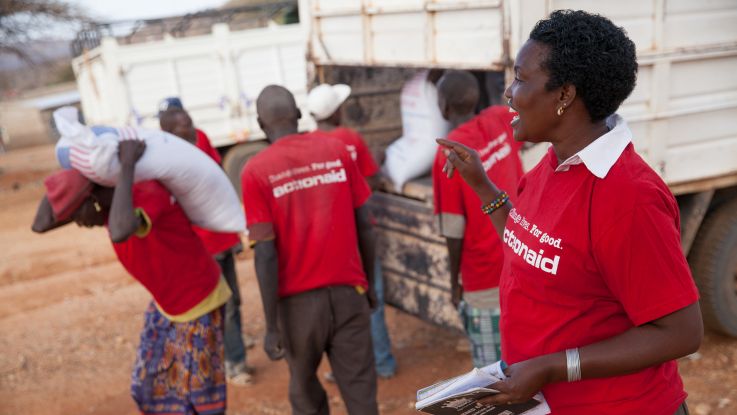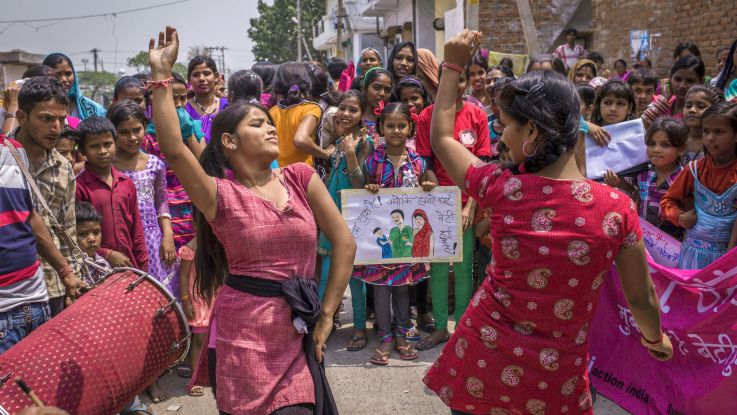UK aid must remain transparent and effective, with the rights of women and girls as a primary area of focus."
The newly-created Foreign, Commonwealth and Development Office (FCDO) presents an opportunity for UK aid to become more transparent and effective than ever before.
In line with international regulations and UK law, our aid budget should go to the people and communities who need it most - to the poorest and most marginalised, rather than being diverted for political or commercial gains.
COVID-19, the climate emergency and humanitarian crises around the world have all disproportionately impacted women and girls, at home and abroad. This is why ActionAid believes that women's rights should be central to the FCDO mission and to the UK aid strategy.
Key proposals
Women's and girls' rights
1. The FCDO should develop an action plan for making gender equality a core priority through all its work
Why? The 2030 Strategic Vision for Gender Equality calls on UK Government departments, and their partners, to recognise the barriers that women and girls face in reaching their rights and potential. It also proposes maintaining or increasing the current level of spend on gender equality.
By putting this vision into practice, the new FCDO will help ensure that the protection and promotion of women’s rights are central to the UK’s approach to international development and humanitarian response.
This will help increase women’s leadership and participation in politics and decision-making and help set the foundations for peaceful, just and inclusive societies and thriving economies.
2. The FCDO’s Single Departmental Plan should include measurable commitments on gender equality
Why? Core to the new department’s mission should be a focus on achieving gender equality for women and girls affected by poverty, crises and conflict. These commitments must be measurable – this way we can track progress and identify areas in need of improvement.
3. The FCDO should apply the 2002 and 2014 International Development (Gender Equality) Act to all UK aid spending
Why? The 2002 Act requires all UK aid to further sustainable development, promote human welfare and contribute to poverty reduction.
Under the SDGs the UK has committed to ‘leaving no-one behind’. A minimum of 50% of aid spending across the UK aid budget should be channelled to the Least Developed Countries (LDCs) and fragile states.
The UK should also remain committed to upholding International Humanitarian and Do No Harm Principles, ensuring that UK aid delivers life-saving assistance without exacerbating crises.
The 2014 Gender Equality amendment was passed with strong, cross-party support. It consolidated the UK’s global reputation at the forefront of the fight against gender inequality; it is an important part of our legacy and position as a force for good in the world. It requires that all UK Aid must help reduce gender inequality.
4. The FCDO should commit to refreshing the 2017 Economic Development Strategy, with meaningful consultation with civil society and women’s rights organisations
Why? This will ensure a coherent approach to economic development that reflects what the world’s poorest women really need to realise their rights.
The refreshed strategy should be informed by gender analysis (ensuring we fully understand what will work to support women and girls, alleviate poverty and increase their leadership) and the expertise of civil society and women’s rights organisations.
The strategy should also be informed by the projected economic impacts of COVID-19 in developing and fragile countries, as well as the need to build back better and greener. The crisis has exposed the deep inequalities experienced by women and girls, and we need approaches that address the barriers they face.
5. The FCDO should maintain and build upon DFID's experience and technical expertise in gender equality
Why? The FCDO should capitalise on the benefits from the world-renowned technical and research expertise within the Department for International Development (DFID). This will ensure that both foreign policy and development objectives – as well as country plans – can be met, and that the positive impacts are felt by women and girls in the world’s poorest communities.
The FCO’s extensive diplomatic expertise and network (including the global reach of its public bodies, notably the British Council and BBC World Service) can complement existing DFID expertise, which will help the UK develop bilateral strategies with priority countries.
6. The FCDO should ensure its crisis response and programming are effective, flexible and informed by what works for women and girls
Why? When crisis hits, women and girls are often disproportionately affected. Gender analysis can ensure aid is focused where its impact will be greatest, through investing in the leadership of women and girls on the frontlines. As COVID-19 has shown us, flexible funding allows actors to rapidly respond to changing contexts and emerging needs. This prevents the displacement and violence risks that emerge in times of crisis.
7. The FCDO should strengthen UK commitments on localisation, by providing more support and funding for local and national responders
Why? Targeting aid to local actors, in particular women’s rights organisations (WROs) which have deep roots in their communities, is fundamentally good aid, harnessing local expertise and influence, as well as being an effective route to addressing the needs of vulnerable communities. Moreover, support for localisation (shifting power to local and national responders) is one of the UK’s key commitments under the Grand Bargain.
The expertise of DFID, combined with the FCO’s extensive diplomatic network (including the global reach of its arms-length bodies, notably the British Council and BBC World Service) provides a unique opportunity to deliver the localisation agenda.
Transparency, scrutiny, and accountability
8. The Government should support the creation of a cross-departmental House of Commons select committee to scrutinise all UK aid, wherever it is spent
As the Government establishes its vision to be a truly global Britain, the UK’s world-leading record on aid transparency and accountability should be understood as vital to the UK’s credibility on the global stage. The UK taxpayer should feel confident that aid is meeting the needs of those who require it most, and is not being ‘traded away’ or mismanaged.
9.The FCDO must establish a Cabinet representative for International Development, who also holds a place on the National Security Council
Why? A Cabinet representative would guarantee that humanitarian and development considerations are heard at the top of Government, enabling a coordinated, coherent approach at all levels. This would mitigate against global perceptions that the UK has deprioritised international development.
10. The FCDO must maintain commitments to deliver ‘Good’ aid as per the Aid Transparency Index (IATI)
IATI is a critical measure. In its 2015 Aid Strategy, the Government aimed for all aid spending departments to be ranked ‘Good’ or ‘Very Good’ in IATI. Just three out of 10 departments, including DFID, have achieved this. The creation of the FCDO presents an important opportunity to lead the delivery of ‘good’ aid across all departments.
Page updated 27 September 2022



